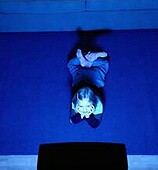
MONDAY, Jan. 14 (HealthDay News) — Children and teens who spend time watching television, playing video games or using the computer right before bedtime are likely to take longer to fall asleep than those who watch less or none, according to new research.
And that could add up to a sleep deficit, experts said.
“Reducing screen time in this pre-sleep window could be a good strategy for helping kids go to sleep earlier,” said study leader Louise Foley, who was a researcher at the University of Auckland in New Zealand at the time of the study.
Foley and her team zeroed in on how much TV watching and video game playing children and teens, 5 to 18, did in the 90 minutes before their bedtime. They also looked at how long it took them to fall asleep. The more screen time, the longer it took to doze off.
The study was published online Jan. 14 and in the February print issue of the journal Pediatrics.
The findings are no surprise, said Dr. Dimitri Christakis, a distinguished professor of pediatrics at the University of Washington, in Seattle. Christakis has studied the effects of media use on children.
“There is growing evidence that media use around sleep time is bad for sleep initiation,” Christakis said.
The new study, he said, suggests that “it’s not so much having a bedtime for your children. You have to have a bedtime for their devices.”
Although previous research has found that television viewing and other “screen-time” activities are linked with a decline in the length of time children and teens sleep, the new study is believed to be the first to look at the pre-bedtime period by asking youth (or their parents, for the younger children) to account for their time in detail.
In the new study, the researchers found that about one-third of the 90 minutes before bedtime, on average, involved watching television, playing video games or working at the computer.
Engaging in such screen time, experts say, can cause arousal, making sleep difficult. The blue light from screens can affect circadian rhythms and adversely affect falling asleep.
Differences found between sleep onset were wide-ranging. For instance, those in the late group spent 13 more minutes of screen time before bed than did those in the early-to-sleep group.
Although the difference may seem small, it adds up to an hour less sleep over the school week.
The new study findings add to accumulating evidence about the problem of too little sleep in children and teens, said Dr. Roya Samuels, an attending pediatrician at Cohen Children’s Medical Center in New Hyde Park, N.Y.
“We’ve seen so many studies over the past couple years that have concentrated on the effects of inadequate sleep,” she said. It has been linked with “all sorts of detrimental consequences on kids’ behavior patterns the next day — increased aggression, being hyperactive.”
Samuels blames lack of sleep in children and teens on a lack of proper winding-down activities — and often that’s because they are busy watching television or using the computer.
“Sleep is just as important in terms of growth and development as nutrition,” she said. “Kids need adequate sleep to grow emotionally, physically and mentally. Two hours before bedtime should be calm time.”
She said she realizes this is a challenge, with many parents juggling work and household and parenting demands, including homework supervision.
Foley suggested encouraging kids to try activities that don’t take place on-screen. The entire family could participate in a non-screen activity such as arts and crafts together right before bedtime, she said.
“It’s a lot easier for a child to reduce screen time if the whole family has made a commitment to watching less TV,” she said.
How much sleep is enough? Although people vary in their needs, the National Sleep Foundation suggests preschoolers need about 11 to 13 hours, elementary school children about 10 or 11 hours and teens 8.5 to 9.25 hours.
More information
To learn more about sleep needs, visit the National Sleep Foundation.

